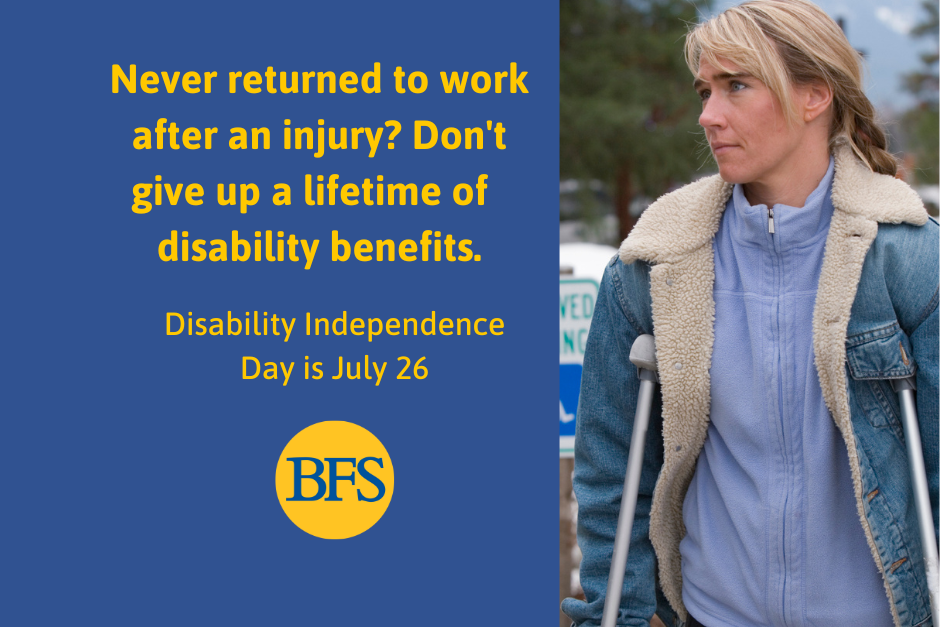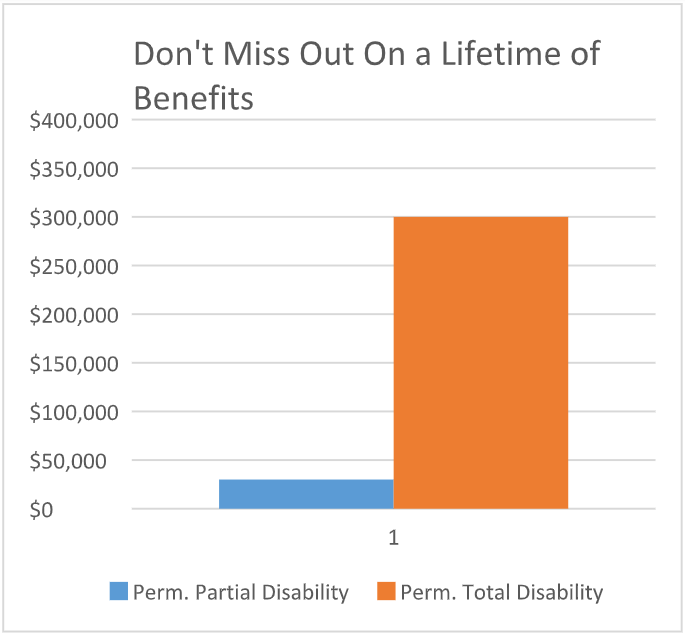Never Returned to Work after an Injury? Don't Give Up a Lifetime of Disability Benefits

July 26 is Disability Independence Day, which commemorates the signing of the Americans with Disabilities Act in 1990. Today we pay tribute to our clients and members of our Vermont community who have suffered injuries that have left them with a permanent partial or total disability for life.
Most injured workers return to work, but some have injuries so catastrophic or painful that they are incapable of doing regular, paid work again. If this is you, or you know someone in this situation, read on to learn why you may be missing out on a lot of money.
What is Permanent Disability?
When your temporary disability benefits run out (because you returned to work or reached maximum medical improvement), you may be entitled to get permanent disability benefits.
When an injured worker with an accepted workers’ compensation claim reaches “medical end result,” as determined by their doctor, they are usually entitled to permanent disability benefits. These can be permanent partial disability (PPD) payments, which are weekly checks given to you if you recover but are still left with a permanent disability, such as a limp, lingering pain, or loss of range of motion. But sometimes, due to the serious nature of their injury, a person cannot work anymore. This is called permanent total disability (PTD). It starts when permanent partial disability (PPD) ends. PTD can provide a lifetime of wage replacement benefits but to get it you have to be unable to engage in sustained, paid employment. In other words, you can no longer work enough hours or earn enough money to support yourself. You cannot be simply “retired” or decide not to go back to work.
A Settlement Doesn’t Necessarily Mean Your Case is Closed
If you are awarded permanent partial disability (PPD) benefits after your work injury, you will get weekly compensation checks in proportion to your impairment rating under the American Medical Association’s Guidelines to Permanent Impairment. This weekly PPD may also be paid in a lump sum payment called a permanent impairment agreement. Often, workers who get this lump sum payment believe that their workers’ compensation claim is closed or “settled”. This is untrue and workers who don't know this can lose out on a lot of money if they never go back to work because of their injury.
Permanent Total Disability Benefits Last a Lifetime
In Vermont, the law provides lifetime wage replacement payments for a worker who is permanently and totally disabled because of their injury and can never go back to regular paid employment. If you are eligible, PTD entitles you to get weekly benefit checks for the rest of your life or, even better, a lump sum settlement of those benefits that does not mess up your Social Security benefits. These lifetime payments can bring great relief to an injured worker and their family, but unfortunately, the insurance company does not tell injured workers about them. People often believe that their permanent impairment agreement (their permanent partial disability benefit) is the end of their case. As a result, we often get calls from people who have been out from work for years with work injuries and have no idea that they are entitled to anything more. To get this very valuable benefit, you need very specific legal proof that you are UNABLE to work. Most injured workers cannot get this on their own, and this is where experienced attorneys like BFS can help.

Are You Eligible for PTD?
If you have a work injury, you might be eligible for PTD if:
- You never returned to regular, paid work after your work injury, even if it’s been many years.
- You think your workers’ compensation claim is closed because you were paid a permanent impairment agreement, but your injury still affects you.
- You went through vocational rehabilitation and are still not able to return to work, or you work a few hours a week.
- You suffered a catastrophic injury that automatically qualifies you as permanently and totally disabled. Examples include blindness in both eyes, loss of a limb, certain spinal and skull injuries.
- Your injury, together with other factors like your age, work experience, or level of education, makes you unable to work.
Get Good Advice
If this describes you or someone you know, we strongly urge you to talk with an experienced workers’ compensation attorney. At BFS, we have handled hundreds of permanent total disability cases, including many where a worker did not know they were eligible until years later. It is heartbreaking to meet someone who is struggling to get by when they could have the security of a weekly check or lump sum settlement for the rest of their life. We are always glad to help injured Vermonters who find themselves in this situation.
Contact us at 802-229-5146 to schedule a free consultation with a workers' compensation attorney.
Get a FREE Case Evaluation Today
Send us a short message describing your case, and our lawyers will get back to you as soon as possible. Our office hours are Monday–Friday 8:30 a.m.–5:00 p.m.